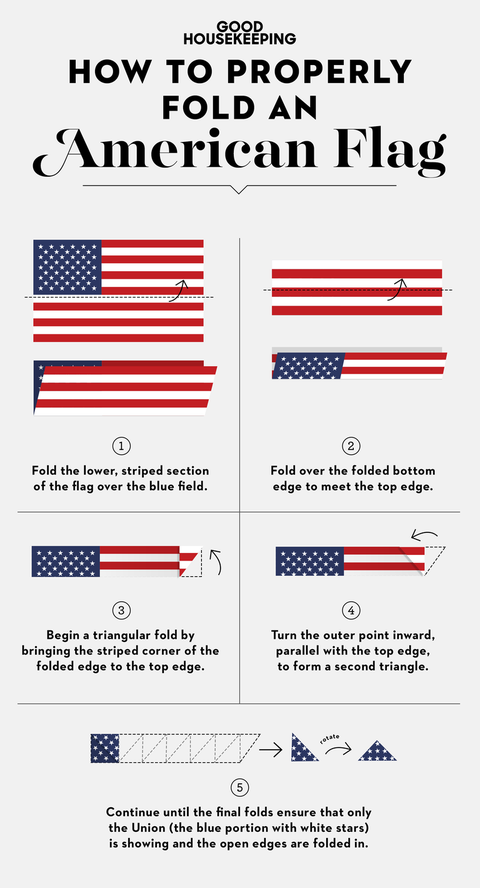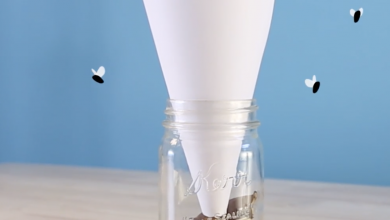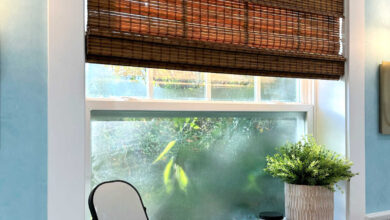How to Hang an American Flag

[ad_1]
Displaying an American flag is a great way to show off your love for our country. However, your act of patriotism can quickly become (unintentionally) disrespectful if you’re unaware of an important set of rules. The U.S. Flag Code, established by Congress in 1942, offers guidelines for treating this national symbol with dignity.
You can fly the American flag on all days, but the Flag Code especially recommends displaying it on Independence Day, as well as other major holidays like Flag Day, Labor Day and Veterans Day.
Take note: Memorial Day has its own flag etiquette. The American flag should be flown at half-mast from sunrise until noon, then raised to full mast for the rest of the holiday.
Brush up on the rest of your flag etiquette ahead of Memorial Day weekend by learning how to fly the Stars and Stripes the right way.
There’s a right and a wrong way to hang the flag vertically.
Don’t hang your flag backwards, upside down, or in another inappropriate fashion. If you’re hanging your flag vertically (like from a window or against a wall), the Union portion with the stars should go on the observer’s left. Never dip the flag to any person or anything.
Avoid letting the flag touch the ground.
Prevent your flag from touching the ground, floor, or water. It’s not necessary to dispose of your flag if it accidentally hits the pavement, but you should make sure that it’s in good condition before displaying it again.
Know the difference between half-staff and half-mast.
There is a difference between half-staff and half-mast, even though they’re commonly used interchangeably. “Half-mast” technically refers to a flag flown on a ship’s mast, while “half-staff” describes flags flown on land.
Fly your flag on half-staff at the right times.
The flag is flown at half-staff when the nation is in mourning, such as for the death of government official or for remembrance, as well as from sunrise to noon on Memorial Day. When flying the flag at half-staff, first hoist it to the peak for an instant and then lower to the half-staff position.
Half-staff is defined as one-half the distance between the top and bottom of the flagpole. The flag should be again raised to the peak before it is lowered for the day.
Only fly a flag at night if it is illuminated.
Custom dictates that you should display flags only from sunrise to sunset, but you can keep the stars and stripes flying 24 hours a day if it is properly illuminated during the hours of darkness.
Don’t fly the flag when it rains.
If the forecast calls for inclement weather, you’re not supposed to display the flag — except if it’s an all-weather flag. However, most flags these day are made of all-weather, non-absorbent materials like nylon, the American Legion states.
Always fly the American flag above other flags.
That includes state and city flags. If they have to be at the same level (i.e., you’re hanging them vertically from a house or porch), put the American flag on the left. Always hoist the American flag first and lower it last.
Only fly a flag in good condition.
No matter how well you take care of Old Glory, sometimes age just wears down a flag. Newer flags made with synthetic materials can be machine washed in cold water with a mild detergent, and hung to dry.
Older, more fragile flags should be hand washed using Woolite or a similar product. Small tears can be repaired by hand, so long as the mends aren’t overtly visible when the flag is displayed. Flags that are overly worn, torn, or faded should be properly disposed of.
Dispose of an old flag in a respectful manner.
The Federal Flag Code says that unserviceable flags should be burned in a respectful, ceremonial manner, but do so discreetly so people don’t misinterpret your intentions. If it is illegal to burn synthetic materials in your state or you feel uncomfortable doing so, contact your local American Legion post to find out if they have flag disposal ceremonies, which commonly occur on Flag Day, June 14. Local Scout troops are another resource for disposing your retired flag in a dignified and respectful way.
Fold your flag before storing it.
The American flag is traditionally folded in a specific arrangement, but we guarantee it’s easier than folding a fitted sheet. When you have to store your flag, grab another person to help you. Begin by holding it parallel to the ground with another person, and fold the lower stripes lengthwise over the Union, keeping the edges of the flag crisp and straight. Fold it lengthwise again, keeping the blue Union on the outside.
Now make a triangular fold by bringing the striped corner of the folded edge to the open edge of the flag, and then turn the outer point parallel to the open edge to make a second triangle. Continue making triangular folds until the whole flag is folded into one triangle of blue and white stars.
Skip clothing and objects with flags on them.
While this section of the Flag Code is rarely observed, the guidelines advise against using the flag on clothing, costumes, athletic uniforms, bedding, cushions, handkerchiefs, other décor, and temporary-use items like paper napkins and boxes. It does permit flag pins worn over the left lapel and flags on military and first responder uniforms.
However, the Supreme Court ruled in 1984 in the case Texas v. Johnson that the government can’t enforce flag-protection laws, so you won’t get arrested for wearing an American flag T-shirt. Do whatever feels most respectful and appropriate to you.
Avoid these common flag mistakes, too.
Besides wearing flag-covered clothing, there are a couple other Flag Code violations that you can easily avoid. Most of these concern flag placement — a flag should never touch anything beneath it while it’s flying, it should never been used as covering for a ceiling, and you should never place anything on the flag (like a “mark, insignia, letter, word, figure, design, picture, or drawing of any nature”).
This content is created and maintained by a third party, and imported onto this page to help users provide their email addresses. You may be able to find more information about this and similar content at piano.io
[ad_2]
Source link








